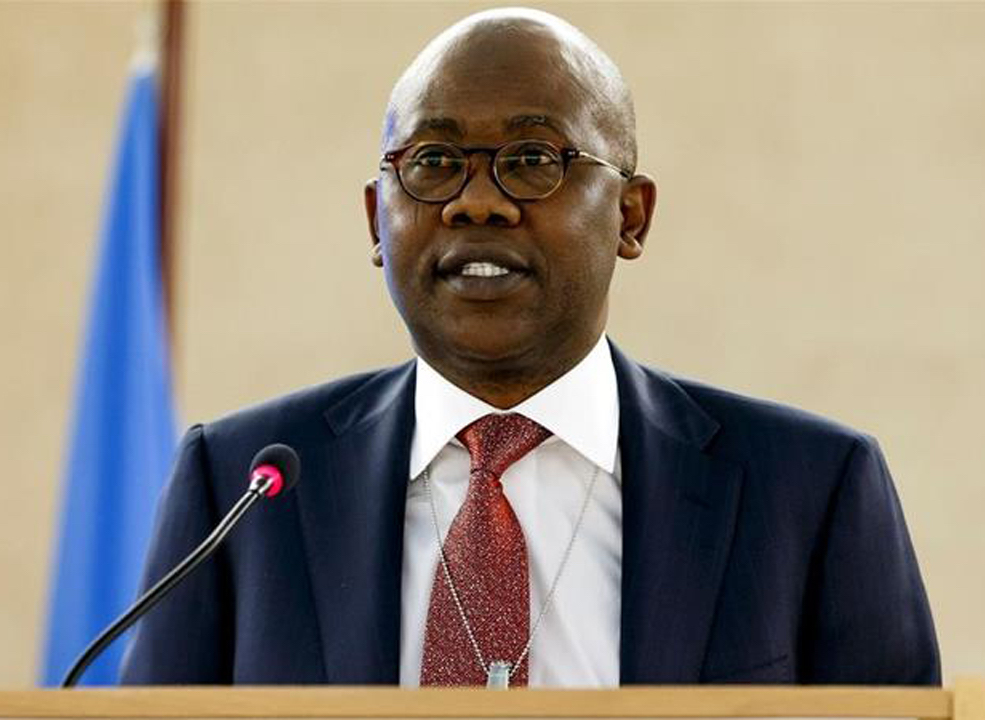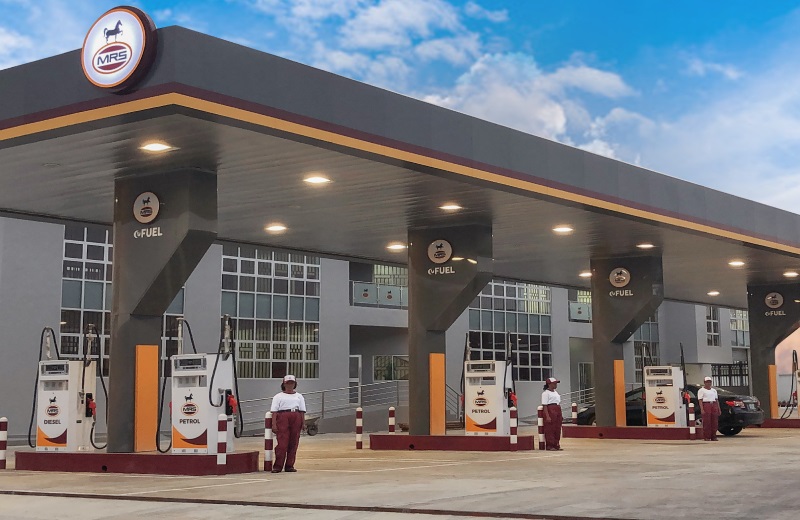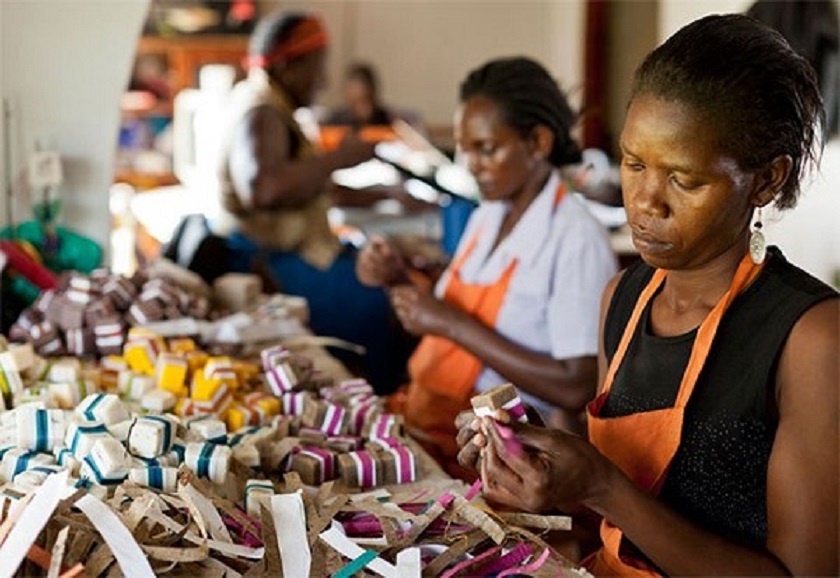General
Malabu Oil: Again, Court Frees Ex-AGF Adoke of Money Laundering Charges

By Adedapo Adesanya
The Federal High Court in Abuja, on Friday, dismissed money laundering charges filed against a former Attorney General of the Federation (AGF) and Minister of Justice, Mr Bello Adoke.
The judge, Justice Inyang Ekwo, upheld the “no-case-submission” application filed by Mr Adoke after the prosecution, the Economic and Financial Crimes Commission (EFCC), concluded its case and it was the turn of the defendants to present theirs.
A no-case submission is filed by a defendant at the end of the prosecution’s case, asking the court for an acquittal without having him or her present a defence. Such filing is premised on the presumption by the defendant that the prosecution, with all its witnesses and evidence tendered while making its case, failed to link him or her to the alleged crimes.
Mr Adoke was standing trial along with Mr Aliyu Abubakar, a businessman, on money laundering charges in the case.
In his ruling on Friday, Mr Ekwo said the EFCC failed to provide any substantial evidence linking Mr Adoke to the alleged offence.
The judge went ahead to discharge and acquit Mr Adoke of alleged offences.
But, the judge dismissed Mr Adoke’s co-defendant’s no-case-submission, ordering Mr Abubakar to enter his defence in the trial.
The ruling tallies with the judgement of the Federal Capital Territory (FCT) High Court in Jabi, Abuja, which, three weeks ago, freed Mr Adoke of complicity in alleged fraud in the controversial Oil Prospecting Licence (OPL) 245, widely known as Malabu Oil deal.
In the FCT High Court case, Mr Adoke, who was justice minister under former President Goodluck Jonathan’s administration, was charged alongside a businessman, Aliyu Abubakar; Rasky Gbinigie; Malabu Oil and Gas Limited; Nigeria Agip Exploration Limited; Shell Nigeria Extra Deep Limited and Shell Nigeria Exploration Production Company Limited over the Malabu oil scam.
They were arraigned in 2020 on a 40-count amended charge.
EFCC had, in the FCT High Court, conceded that it lacked evidence against Mr Adoke and his co-defendants, but insisted that it had led credible evidence to warrant the former AGF to enter his defence in the matter.
However, in the Federal High Court case in which judgement was delivered on Friday, the EFCC had charged Messrs Adoke and Abubakar, alleging money laundering to the tune of N300 million.
The anti-graft agency had, on August 4, 2020, re-arraigned Messrs Adoke and Mr Abubakar on an amended 14 counts of money laundering.
In count 9 of the charges, the EFCC had alleged that Adoke, sometime in 2013, in Abuja, “made a cash payment of $2,267,400 to Risslanudeen Muhammed” and thereby “committed an offence contrary to the combined effect of section 16(1)(d) and of section 19a) of the Money Laundering Prohibition Act, 2011 (as amended) and punishable under section 16(2)(b) of the same Act”.
There was no mention of the Malabu Oil deal in the case before Mr Ekwo, however, the details of charges featured in the charges that were before the FCT High Court, where the EFCC said the N300 million was a kickback from the sale of the oil block by Malabu Oil & Gas Limited in 2011.
Each of them faced seven counts. They had pleaded not guilty.
The court exonerated Mr Adoke on Friday but ordered the proceedings to continue against his co-defendant, who is now to enter his defence.
Friday’s ruling brings to an end Mr Adoke’s trial in connection with the controversial Malabu Oil scam.
The Malabu scandal involved the transfer of about $1.1 billion by Shell and ENI through the Nigerian government to accounts controlled by a former Nigerian petroleum minister, Mr Dan Etete.
From accounts controlled by Mr Etete, about half the money ($520 million) went to accounts of companies controlled by Mr Aliyu Abubakar, popularly known in Nigeria as the owner of AA Oil.
The transaction was authorised in 2011 by Mr Jonathan through some of his cabinet ministers and the money was payment for OPL 245, one of Nigeria’s richest oil blocks.
The oil resources of the OPL 245 licence have remained undeveloped since the controversies began.
Eni initiated international arbitration proceedings against Nigeria in September, alleging the Nigerian government has breached its obligations by refusing to let the firm develop the licence, which has now expired this May.
General
Ikeja Electric Fumes Over Impropriety Allegations Against CEO, Chairman

By Adedapo Adesanya
Ikeja Electricity Distribution Company has described as malicious and misleading a widespread publication currently circulating online alleging impropriety about its chief executive, Ms Folake Soetan, and its board chairman, Mr Kola Adesina.
The management of the DisCo noted that a publication attributed to ‘Nigerian Global Business Forum’ defamed its CEO and the chairman of the IKEDC board.
The company said, “The publication, attributed to yet to be verified individuals and organisation, is clearly intended to misinform the public and bring the company and its leadership into disrepute through fabricated claims, the DisCo observed.”
Ikeja Electric noted that its investigation so far revealed that the ‘Nigerian Global Business Forum’ is an unregistered organisation with no recognised legal or corporate existence locally or abroad.
According to the energy firm, the signatories, “Dr Alaba Kalejaiye” and “Musa Ahmed,” have no verifiable professional credentials or established public profiles, and the publication contains false and misleading statements regarding Ikeja Electric’s operations, safety record, and financial practices.
The organisation said it had instructed its legal advisers to conduct a thorough forensic investigation and to initiate defamation proceedings against the authors, publishers, and any persons or entities found responsible for sponsoring or disseminating this malicious publication.
Ikeja Electric said it operates within a strict framework of accountability and remains committed to transparency and service improvement, warning it will not tolerate coordinated disinformation campaigns aimed at undermining public confidence and tarnishing its corporate integrity.
“Ikeja Electric remains steadfast in its mandate to deliver reliable power while upholding the highest standards of corporate governance and customer excellence.
Members of the public are advised to disregard the false publication in its entirety,” it said in a statement.
General
PMS May Sell N1,000 Per Litre if Marketers Adopt Costly Coastal Loading

By Aduragbemi Omiyale
Nigerians may be forced to purchase premium motor spirit (PMS), commonly known as petrol, for almost N1,000 per litre if marketers choose to go for the costly coastal evacuation and not the cheaper gantry loading, the Dangote Petroleum Refinery has cautioned.
Though the company clarified that marketers were free to choose their preferred mode of evacuation, it emphasised that the implication of adopting the coastal loading was that consumers would pay more for the product because of the extra costs.
According to Dangote Refinery, “Coastal logistics can add approximately N75 per litre to the cost of petrol, which, if passed on to consumers, would push the pump price of PMS close to N1,000 per litre.”
The firm noted that its “world-class gantry facility” has 91 loading bays capable of loading up to 2,900 tankers daily.
Operating on a 24-hour basis, the facility can evacuate over 50 million litres of Premium Motor Spirit PMS, 14 million litres of Automotive Gas Oil (diesel) and other refined products each day, it added, urging marketers and policymakers to prioritise logistics choices that support price stability and consumer welfare.
It stressed that direct gantry evacuation eliminates port charges, maritime levies and vessel-related costs that do not add value to end users, helping to optimise costs, improve distribution efficiency and support price stability.
“Reliance on coastal delivery, particularly within Lagos, may introduce avoidable costs with material implications for fuel pricing, consumer welfare and overall economic wellbeing,” the company stated in a statement.
Based on Nigeria’s average daily consumption of about 50 million litres of PMS and 14 million litres of diesel, the refinery estimated that sustained dependence on coastal logistics could impose an additional annual cost of roughly N1.752 trillion. This cost, it said, would ultimately be borne either by producers or Nigerian consumers.
The refinery also renewed calls for coordinated investment in pipeline infrastructure nationwide, arguing that functional pipelines linking refineries to depots would significantly cut distribution costs, improve supply reliability and strengthen national energy security.
It said domestic refining has already delivered measurable benefits to the Nigerian economy. Since the commencement of operations, the price of diesel has fallen from about N1,700 per litre to N1,100 and currently trades between N980 and N990. Similarly, PMS prices have declined from about N1,250 per litre to between N839 and N900.
It added that increased local supply has sharply reduced fuel importation, eased foreign exchange pressures and improved market stability, contributing to a stronger naira, which recently traded at about N1,385 to the dollar.
General
FG Targets 25 million Women in New National Programme Scale-up

By Adedapo Adesanya
The federal government has launched the Nigeria for Women Programme Scale-Up (NFWP-SU), a strategic investment initiative which is expected to target over 25 million Nigerian women nationwide.
In a Friday statement, it was disclosed that President Bola Tinubu this week inaugurated the NFWP-SU programme, declaring the initiative a strategic national investment and unveiling the government’s ambition to expand its reach to over 25 million Nigerian women across the country.
According to the statement, the President, represented by Vice President Kashim Shettima, said the scale-up marks a decisive shift in Nigeria’s development strategy, with women’s economic empowerment, family stability, and social development placed firmly at the centre of national growth.
He stressed that Nigeria cannot achieve sustainable prosperity while half of its population remains structurally constrained.
“Women are not peripheral to national development. They are central drivers of productivity, custodians of family stability, and indispensable partners in our ambition to build a resilient, competitive and prosperous nation,” the President said, noting that empowering women is essential to job creation, food security, financial inclusion and economic diversification under the Renewed Hope Agenda.
President Tinubu described the programme as more than a social intervention, calling it “a strategic investment in Nigeria’s economic infrastructure.”
He said the success of Phase I of the programme, which reached over one million beneficiaries across six states, provided strong evidence that structured, data-driven empowerment models deliver measurable, lasting impact.
Building on that evidence, the President announced a bold national ambition to scale the programme beyond its current targets to reach 25 million women nationwide, creating a sustainable platform for women’s economic inclusion embedded in federal, state and local systems.
He called on development partners, particularly the World Bank, to support the expansion through financing, technical assistance and innovation.
According to the President, the integration of digital platforms such as the Happy Woman App, identity verification and transparent targeting reflects the administration’s insistence on measurable and verifiable public policy.
“The work of the Ministry has shown what focused execution can achieve. This is how public trust is rebuilt and how government resources reach real people with real impact,” he said.
On his part, World Bank Country Director for Nigeria, Mathew Verghis, said the Bank was honoured to co-finance the NFWP-SU with the Federal and State Governments, describing it as fully aligned with the Bank’s new Country Partnership Framework for Nigeria, which prioritises unlocking economic opportunities, strengthening private sector linkages and creating more and better jobs.
Mr Verghis noted that Nigerian women remain disproportionately affected by poverty, with 64.3 per cent living below the lower-middle-income poverty line, despite their critical contributions to agriculture, trade and enterprise.
He said the Women Affinity Group (WAG) model promoted under the programme has proven to be a powerful tool for lifting women out of poverty by enabling collective savings, access to credit, financial discipline and enterprise growth.
Citing examples from the field, he explained that over 28,000 WAGs currently empower about 600,000 women across Nigeria, allowing them to save together, lend responsibly, invest in businesses and transition into formal financial services.
He added that scaling such models could unlock enormous economic gains, noting estimates that reducing gender inequality could increase Nigeria’s annual GDP growth by more than 1.25 percentage points, while closing productivity gaps across key sectors could add nearly $23 billion to the economy.
“This is smart economics. When women thrive, communities grow stronger, and economies become more resilient,” Mr Verghis said.
Also speaking at the event, Mr Robert S. Chase, World Bank Practice Manager for Social Protection and Jobs, described the Nigeria for Women Programme Scale-Up as one of the most ambitious gender-focused social and economic interventions currently being implemented in Africa.
He said the programme reflects a strong partnership between Nigeria and the World Bank, anchored on evidence, innovation and a shared commitment to lifting millions of women out of poverty.
Mr Chase noted that the programme’s strength lies in its ability to build sustainable systems rather than short-term relief, particularly through the Women Affinity Groups model, which combines social capital, financial inclusion and access to productive opportunities.
According to him, the scale-up phase demonstrates Nigeria’s readiness to institutionalise women’s empowerment as a core development strategy and not merely a welfare initiative.
The NFWP-SU Phase II is a $540 million programme, co-financed by the World Bank and the Federal and State Governments, expanding implementation to all 36 states and the Federal Capital Territory. It aims to directly reach five million women, generate about 4.5 million jobs, and benefit nearly 19.5 million Nigerians indirectly, while laying the groundwork for the broader expansion to 25 million women.
Under the leadership of Minister Imaan Sulaiman Ibrahim, the Ministry of Women Affairs and Social Development has positioned the programme as the centrepiece of wider social and economic reforms.
In Phase I alone, over 26,500 Women Affinity Groups were formed with more than 560,000 members, who collectively saved over N4.9 billion, expanded businesses, paid school fees and met household health needs.
The model has since attracted international interest, with other countries seeking to understudy Nigeria’s experience.
Beyond economic empowerment, the ministry has linked the programme to digital inclusion, civic identity, child protection and family welfare, while rolling out complementary initiatives in agribusiness, energy access, skills development and protection services.
-

 Feature/OPED6 years ago
Feature/OPED6 years agoDavos was Different this year
-
Travel/Tourism9 years ago
Lagos Seals Western Lodge Hotel In Ikorodu
-

 Showbiz3 years ago
Showbiz3 years agoEstranged Lover Releases Videos of Empress Njamah Bathing
-

 Banking8 years ago
Banking8 years agoSort Codes of GTBank Branches in Nigeria
-

 Economy3 years ago
Economy3 years agoSubsidy Removal: CNG at N130 Per Litre Cheaper Than Petrol—IPMAN
-

 Banking3 years ago
Banking3 years agoSort Codes of UBA Branches in Nigeria
-

 Banking3 years ago
Banking3 years agoFirst Bank Announces Planned Downtime
-

 Sports3 years ago
Sports3 years agoHighest Paid Nigerian Footballer – How Much Do Nigerian Footballers Earn












